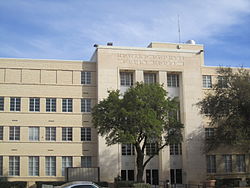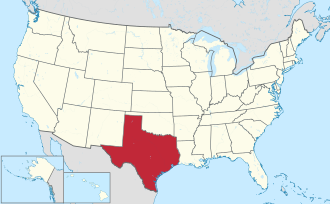Top Qs
Timeline
Chat
Perspective
Howard County, Texas
County in Texas, United States From Wikipedia, the free encyclopedia
Remove ads
Howard County is a county located in the U.S. state of Texas. At the 2020 census, its population was 34,860.[1] Its county seat is Big Spring.[2] The county was created in 1876 and organized in 1882.[3] It is named for Volney E. Howard, a U.S. Congressman from Texas.[4]
Parts of this article (those related to demographics) need to be updated. (March 2019) |


Howard County is included in the Big Spring, Texas micropolitan statistical area.
Remove ads
Geography
According to the United States Census Bureau, the county has a total area of 904.205 square miles (2,341.88 km2), of which 900.791 square miles (2,333.04 km2) are land and 3.414 square miles (8.84 km2) (0.4%) are covered by water.[5]
Howard County is located at the boundary between the Llano Estacado to the north and the Edwards Plateau to the south. Beals Creek, a tributary of the Colorado River, flows through the center of Big Spring and divides these two major physiographic regions.
Major highways
Adjacent counties
- Borden County (north)
- Mitchell County (east)
- Sterling County (southeast)
- Glasscock County (south)
- Martin County (west)
- Dawson County (northwest)
- Scurry County (northeast)
Remove ads
Demographics
Summarize
Perspective
2020 census
As of the 2020 census, there were 34,860 people, 11,674 households, and 7,739 families residing in the county.[12] The population density was 900.79 inhabitants per square mile (347.8/km2). There were 14,000 housing units. The racial makeup of the county was 67.9% White, 4.9% African American, 1.2% Native American, 1.2% Asian, 0.1% Pacific Islander, 10.8% from some other races and 14.0% from two or more races. Hispanic or Latino of any race were 46.4% of the population.[13] 23.1% of residents were under the age of 18, 5.8% were under 5 years of age, and 13.9% were 65 and older.
2000 census
As of the 2000 census, there were 33,627 people, 11,389 households and 7,949 families residing in the county. The population density was 37 people per square mile (14 people/km2). There were 13,589 housing units at an average density of 15 units per square mile (5.8/km2). The racial makeup of the county was 80.14% White, 4.13% Black or African American, 0.59% Native American, 0.59% Asian, 0.01% Pacific Islander, 12.43% from other races, and 2.10% from two or more races. 37.46% of the population were Hispanic or Latino of any race.
There were 11,389 households, of which 32.80% had children under the age of 18 living with them, 53.30% were married couples living together, 12.20% had a female householder with no husband present, and 30.20% were non-families. 26.80% of all households were made up of individuals, and 13.20% had someone living alone who was 65 years of age or older. The average household size was 2.53 and the average family size was 3.07.
24.20% of the population were under the age of 18, 9.00% from 18 to 24, 30.90% from 25 to 44, 21.30% from 45 to 64, and 14.60% who were 65 years of age or older. The median age was 36 years. For every 100 females there were 118.00 males. For every 100 females age 18 and over, there were 122.50 males.
The median household income was $30,805 and the median family income was $37,262. Males had a median income of $28,971 and females $21,390. The per capita income was $15,027. About 14.50% of families and 18.60% of the population were below the poverty line, including 24.70% of those under age 18 and 15.50% of those age 65 or over.
Remove ads
Media
The county is served by a daily newspaper, local radio stations KBST (AM), KBST-FM, KBTS (FM), KBYG (AM), nearby stations KBXJ (FM), KPET (AM) and KWDC (FM), and the various Midland and Odessa radio and TV stations.
Communities
Cities
- Big Spring (county seat)
- Forsan
Towns
Census-designated place
Unincorporated communities
Ghost town
Politics
Summarize
Perspective
From 1912 through 1964, Howard County voters, in common with the Solid South, voted predominantly for the Democratic candidate in presidential elections. Since 1980, the trend has swung to voting chiefly for the Republican candidate.
Remove ads
See also
References
External links
Wikiwand - on
Seamless Wikipedia browsing. On steroids.
Remove ads



